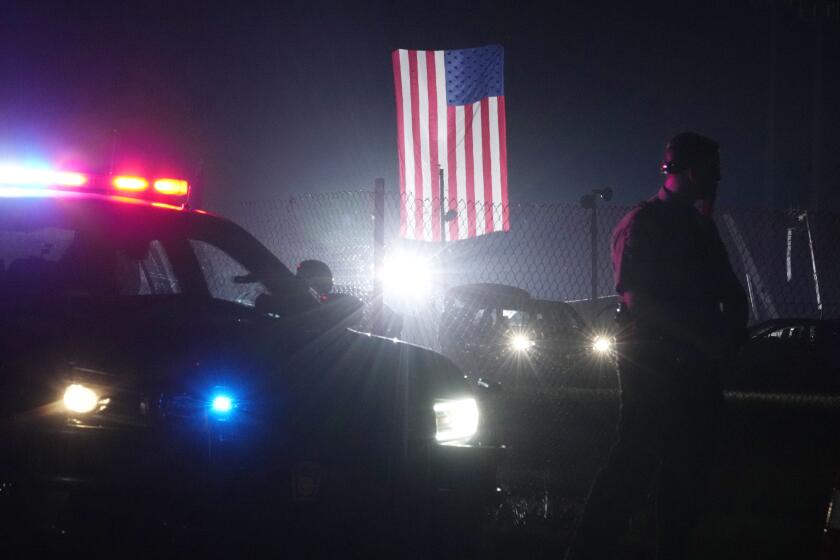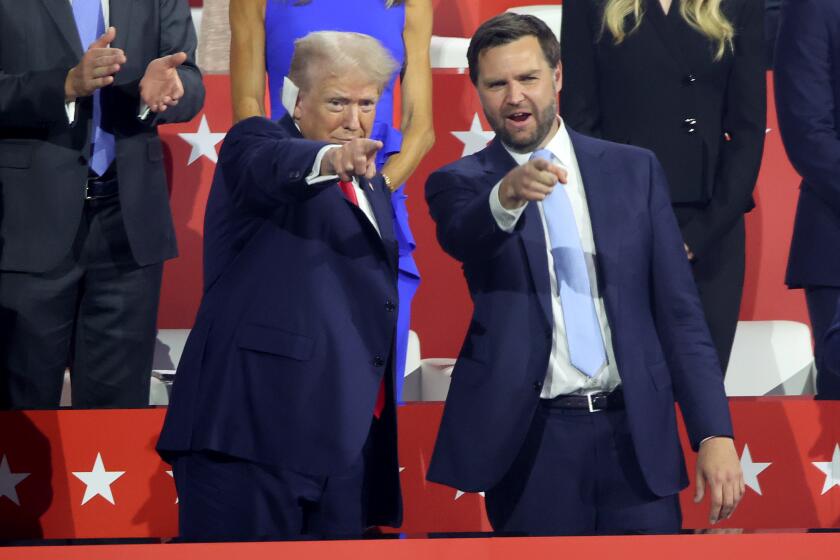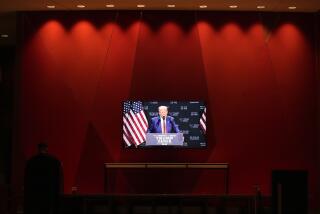Column: Trump betrays call for unity by embracing J.D. Vance, Marjorie Taylor Greene
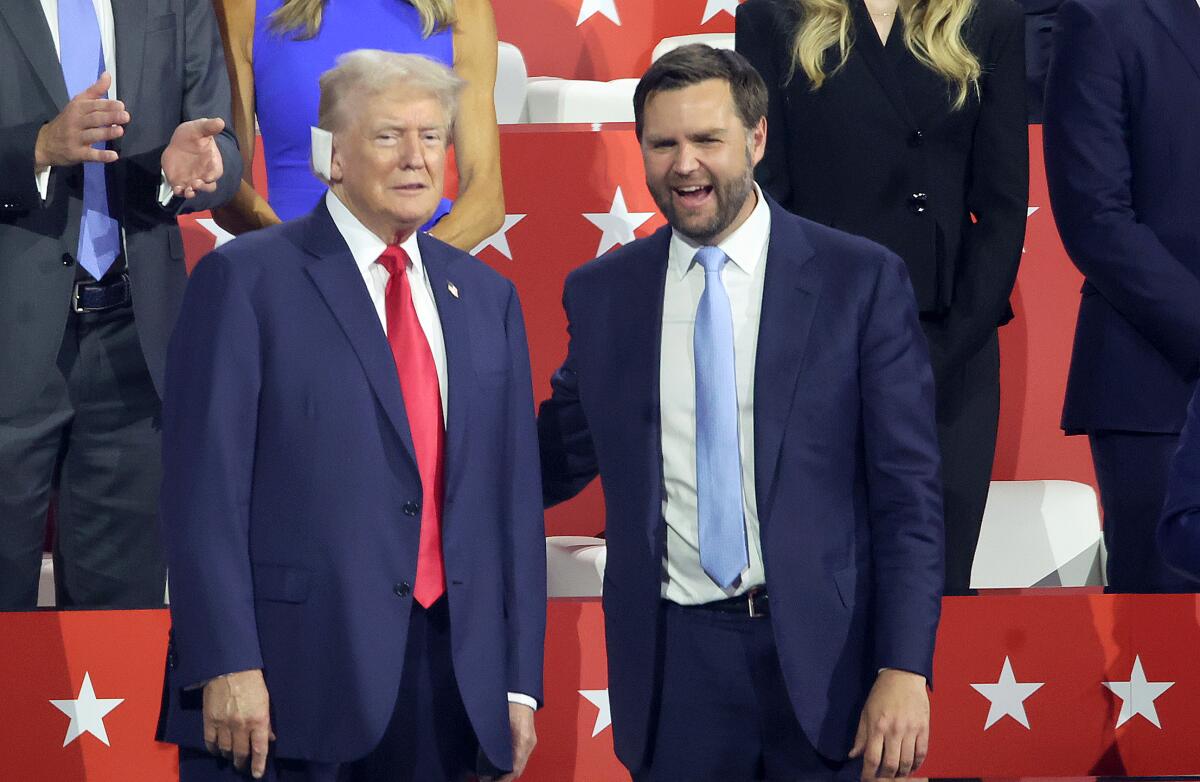
On Saturday, an attempt to assassinate former president and then-presumptive Republican presidential nominee Donald Trump at a rally in Butler, Pa., left firefighter Corey Comperatore dead, two others critically injured and Trump with a wound to his ear.
Social media, being the unregulated thirst game that it is, immediately exploded with a jumble of actual news and opportunistic misinformation — righteous shock and calls for prayer were thrown in among baseless conspiracy theories that ranged from “It was staged” to “Biden did it.”
President Biden attempted to restore calm, denouncing political violence in the strongest terms and calling on Americans to turn down the temperature of the 2024 election campaign, words that were echoed by Speaker of the House Mike Johnson (R-La.). Less predictably, Trump appeared to do so as well, calling for unity “against evil” and saying that, in light of the horrific event, the tone of the Republican National Convention, which began Monday, would change to reflect his message.
I say “less predictably” because it was Trump who ratcheted up and then normalized aggressive, and at times explicitly violent, political rhetoric in America. In the 2016 presidential election, he created a persona that relied almost entirely on blunt force trauma, treating that race, and the one that followed it in 2020, like bar fights. At one point early in the 2016 primary race he famously crowed, “I could stand in the middle of Fifth Avenue and shoot somebody, and I wouldn’t lose any voters.” Relying on mockery, vilification, threats and a willingness to say pretty much anything that would elicit a cheer from the like-minded, he appealed to those who agreed with his strongman approach and/or mistook unfiltered emotion for truth.
We are, and should be, grateful that Trump was not killed at the Butler rally, but that doesn’t change the fact that he, unlike Biden, the Clintons or any other presidential candidate of the modern era, has been willing to incite violence on his own behalf. Trump is the only president in history to send a deadly mob to the Capitol to overturn a fair and legal election that he lost — and to threaten similar consequences should he lose this one. He has regularly promised to jail his opponents and warned that there would be a “bloodbath” if he is not elected in 2024.
That Democrats eventually began responding with heated arguments that Trump posed a threat to democracy is not the same thing at all — on Jan. 6, 2021, we all watched him do it.
So for Trump to call for unity rather than vengeance, to suggest that the personal peril he faced had served as some kind of wake-up call, was, to say the least, notable.
A string of security failures led to a gunman being able to fire multiple shots at former President Trump, killing a retired fire chief and wounding two others, law enforcement sources say.
As many have discovered throughout history, violence, when conjured, is not easily controlled or quelled. Our stories, on page and screen, are filled with those who believed otherwise only to find themselves consumed when violence becomes part of everyday life.
But if Trump had experienced a road-to-Damascus moment on the issue of political violence after the attempt on his life, by Monday it was clear that any reform would be short-lived. He posted a typical rant on Truth Social, celebrating the dismissal of his classified documents case to call for an end to “ALL the witch hunts” including “the January 6 hoax,” characterizing his legal woes, including those in which he was convicted, as an “Election Interference conspiracy” and a “Weaponization of our Justice System.”
Later that day, he named Sen. J.D. Vance (R-Ohio) as his vice presidential nominee. Vance, who in the moments after the shooting and long before any details about the shooter were known, was one of the first elected Republicans to publicly blame Biden and his campaign for the attack. “The central premise of the Biden campaign is that President Donald Trump is an authoritarian fascist who must be stopped at all costs,” Vance wrote in a post on X. “That rhetoric led directly to President Trump’s attempted assassination.”
If Trump himself has not blamed the Democrats for the attack, he clearly supported those who did.
Vance’s uninformed and wildly inappropriate words were undercut not only by the emerging facts — the killer was a 20-year old registered Republican who appears to fit the white male demographic of virtually every mass shooter — but also by Vance’s own previous statements.
Eight years ago, it was Vance himself who called Trump “cultural heroin” and compared him to Hitler.
Even if one accepts Vance’s change of heart on his new running mate (Vance now says he bought into the media’s narrative about Trump), Vance is not exactly a bring-down-the-temperature, unify-the-country kind of guy.
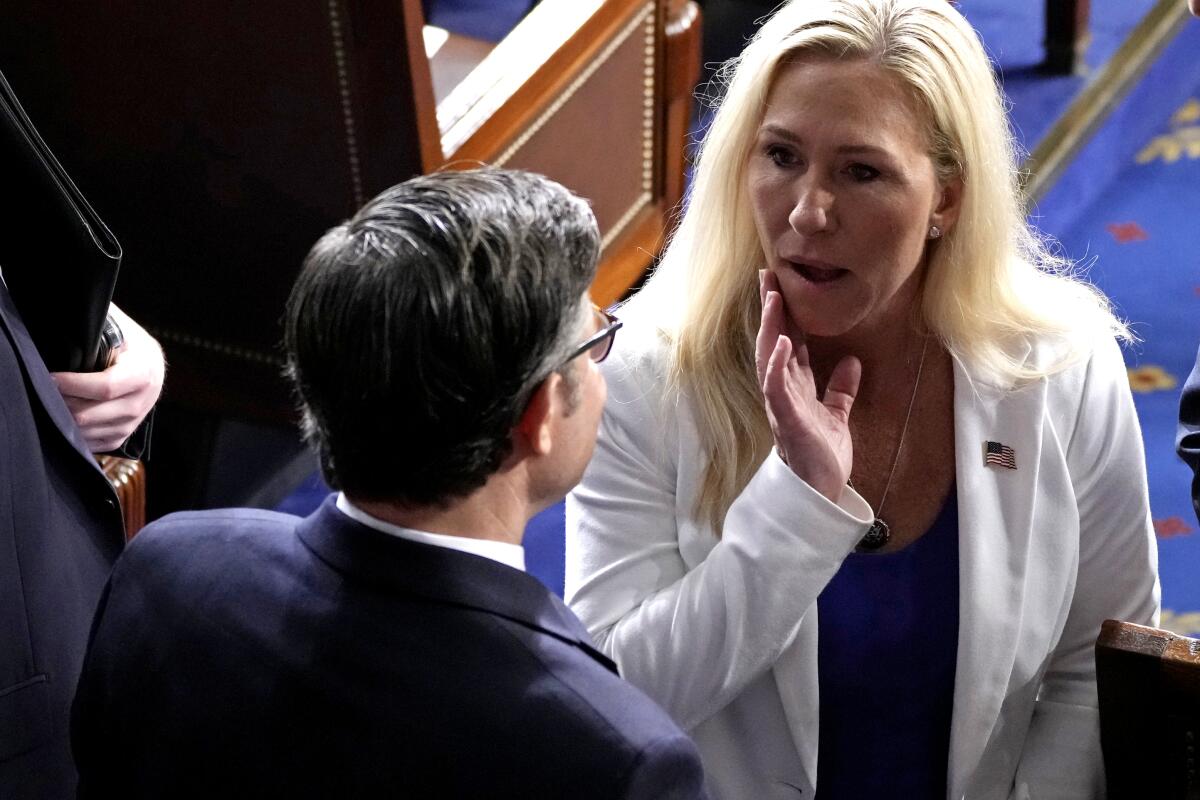
Nor were many of those chosen to speak at the Republican National Convention in Milwaukee on Monday night. Right out of the box, Sen. Ron Johnson (R-Wis.) called Democratic policies “a clear and present danger to our institutions, our values and our people.” (When asked later about the hyperbolic statements, Johnson told an NPR reporter that an older version of his speech had been mistakenly loaded into the teleprompter.)
Rep. Marjorie Taylor Greene (R-Ga.), one of the Republican Party’s most, let’s just say, incendiary members, was the night’s third speaker. Right after Saturday’s shooting, she posted on X that “Democrats wanted this to happen. They’ve wanted Trump gone for years and they’re prepared to do anything to make that happen.” Since then she‘s posted, “The left wants a civil war. They have been trying to start one for years. These people are sick and evil” and “the Democratic Party is flat-out evil and yesterday they tried to murder President Trump.”
The fact that she remained one of the convention’s opening-night speakers indicates Trump’s support for her specious claims.
She did not make any of these dangerous and ill-founded accusations in her relatively short speech Monday night. Instead, she stuck, as many others did, to more general talking points about inflation and immigration, though she did manage to attack transgender people and “illegal” immigrants while indicating that Trump had been anointed by God.
It being the first night of a national convention, most of the speechifying revolved around the greatness of the nominee and the devolution of the country under his opponent. (Strangely, the many speakers who insisted that the country was in much better shape four years ago seem to have forgotten that, four years ago, COVID-19 was killing thousands of Americans every week and the economy was at a standstill.)
The assassination attempt was referenced often, with no blame beyond “evil” attached; certainly gun control was not discussed. Politically, it behooves Republicans to focus on Trump’s survival rather than the fact that yet another young man determined to do violence had access to an AR rifle, with which he killed Comperatore, who died protecting his family.
Many of the speakers commended Trump’s bravery and saw the hand of God in his escape. As expected, Trump made an appearance toward the middle of the evening, a large white bandage affixed to his ear. He moved slowly past the stage. He smiled, waved and offered a raised fist as the audience clapped and cheered, but he seemed uncharacteristically subdued.
Trump’s selection of Vance as his running mate, invocations of God and an unaccustomed attack on ‘corporate elites’ highlight a GOP convention opener that mostly avoids the most incendiary rhetoric.
First-night convention speeches are rarely barn-burners, but even with the appearance of their beloved nominee with his bandaged ear, the energy of the crowd was, like Trump, a bit muffled, as if his supporters were waiting for their cue to cheer Trump’s characteristic scorched-earth calls to action.
It is difficult to imagine Trump campaigning with anything but. Violent rhetoric is Trump’s lingua franca. Exploiting this country’s political divisions with “make them pay” exhortations is his brand.
It’s what his base expects, what they appear to need, just like the heroin addicts Vance referenced eight years ago.
Long after Trump defeated Hillary Clinton, his supporters were still yelling “Lock her up” — even when it was clear that he had no reason for, or intention of, doing so. They supported Trump when he mocked the dreadful attack on Paul Pelosi and the plot to kidnap Michigan Gov. Gretchen Whitmer; they rallied around his insistence that, all factual information to the contrary, Biden did not win the 2020 election. Too many of then followed his instructions to prevent the certification of that election by a show of force that included breaking into and vandalizing the Capitol, killing a police officer and threatening the lives of those doing their sworn constitutional duty, including Trump’s own then-Vice President Mike Pence.
They cheer now when he continues to insist that he was the victim of election fraud, that Jan. 6 was simply a protest by patriots, that he is the victim of a conspiracy. They applaud when he vows to jail or destroy those who oppose him or become a dictator ‘for a day.”
It is true that the presidential campaign needs to cool down, to move from rhetorical violence to debates about policy and how Americans work together to improve its future. But it is disingenuous to suggest that both sides have contributed equally to the current conflagration.
For almost 10 years now, Trump has blown through all the time-honored guardrails of American politicking and the American presidency. Despite the best efforts of those who believe those rails are in place for good reason, words and deeds that once seemed beyond the pale have become normalized. Even if Trump wants to put some of the rails back in place, even if he truly desires to unify the American people and make presidential politics safer for all concerned, he’s got nothing to work with but the wreckage of his own making.
More to Read
The biggest entertainment stories
Get our big stories about Hollywood, film, television, music, arts, culture and more right in your inbox as soon as they publish.
You may occasionally receive promotional content from the Los Angeles Times.
